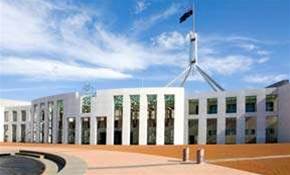The Who’s who

CPR Communications & Public Relations - AAPT, Nextgen, Macquarie Telecom, Competitive Carriers Coalition, Google Australia, Alcatel Lucent, Facebook, OzHub (national cloud computing group).
Kreab Gavin Anderson (KGA) – Last year KGA would have been the leading consultancy and one of the few with permanent offices in Canberra. It once had active accounts for Apple, Australia Post, Time Warner, Vodafone, Google, Foxtel, McAfee, the Internet Advertising Bureau, the Safer Internet Group and the Advertising Standards Board. However a toxic split earlier this year saw many of its partners and employees form a new group called Newgate Communications which recently won the Google Australia account in an open tender.
Barton Deakin – a firm aligned with several Coalition party members including former John Howard adviser Grahame Morris, this firm is also regarded as a major contender with accounts that include Apple, Fujitsu, Motorola and Adobe.
While a change of government would see Barton Deakin’s stocks improve, a similar downgrading is tipped for Hawker-Britton, the firm attuned more to the Rudd Labor government’s times. While it touts itself as “Australia's largest national and international government relations and public affairs company”, its technology portfolio is surprising slim confined to AARNet, Silcar and the little known Broadband Industry Group.
Also regarded as strong in the area of technology lobbying is Galbraith & Company, whose clients include Intel, Juniper Networks, TransACT, iiNet.
In the sensitive area of government IT procurement, the AIIA has made procurement policy one of its strong points and its broad federation of state advisory groups has made it the major player in resolving procurement rules at state and federal levels.
In government IT tenders, Simon Bush’s Bush Consulting Group advises SAP, AHEDA, Fujitsu and Telstra.
Consolidation required?
Bush believes a rationalisation of various industry associations is overdue. The Communications Alliance seems to be taking up the oxygen of many of the others including ISP-based IIA and the Australian Mobile Telecommunications Association (AMTA).
These associations depend very much on the tactical and strategic abilities of their secretariats more than anything else, according to Feyi Akindoyeni, a partner at Newgate Communications.
She agrees there should be some consolidation in the future due to convergence undermining the neat boundaries of the past.
“The AIIA is as good as any association and it would be helpful to bring together the various disparate sources of expertise of the associations under one policy wing, but keep the structure fluid, to allow scope for establishing industry fora on privacy and data, as well as copyright compliance and reforms.”
There was broad agreement that lobby firms would be getting ready for three major uncertainties that their technology clients will expect prompt and helpful advice on:
- The Commission of Audit which is likely to look for more savings in IT procurement projects generally;
- The coming tax review, which is expected to focus on tax minimisation strategies of major IT transnationals raised by the government in the budget in May; and
- Whether the move for copyright reforms may get stalled by an openly conservative stance taken by its likely Attorney-General, George Brandis.
Brandis has been reported elsewhere as being unlikely to move far from current laws.
However copyright is going to become bigger as it brings in the interests of universities, Akindoyeni said.
“Brandis and pro-rights lobbyists may find it difficult to hold the ground.” She predicts policy development will focus more on copyright enforcement change and less on copyright reforms in the near future.


_(23).jpg&h=140&w=231&c=1&s=0)
_(33).jpg&h=140&w=231&c=1&s=0)

_(20).jpg&h=140&w=231&c=1&s=0)





 iTnews Executive Retreat - Security Leaders Edition
iTnews Executive Retreat - Security Leaders Edition
 iTnews Benchmark Awards 2026
iTnews Benchmark Awards 2026
 iTnews Cloud Covered Breakfast Summit
iTnews Cloud Covered Breakfast Summit
 The 2026 iAwards
The 2026 iAwards












_(1).jpg&h=140&w=231&c=1&s=0)



